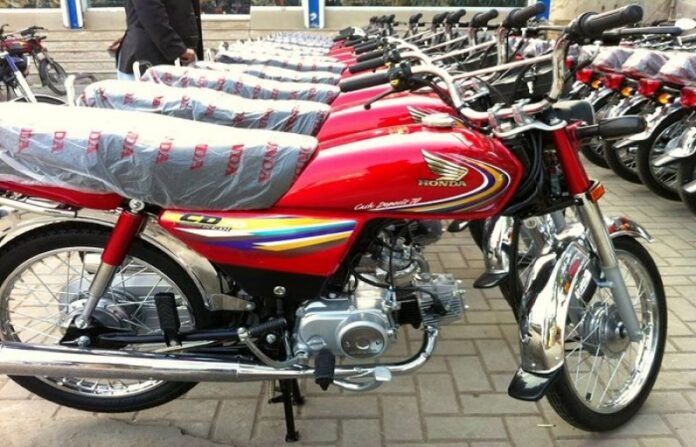LAHORE: There is one and only one undisputed King of Pakistan’s roads: The CD-70. From the 31st March 2020 to the 31st of March 2021, Atlas Honda sold upwards of 800,000 CD-70s.
When corroborated with the Pakistan Automotive Manufacturers Association’s (PAMA) figures, at just 800,000 units, the CD-70 would have constituted 59% of Atlas Honda and 44% of the entire industry’s sales during the aforementioned period. This would place it firmly in first place, far ahead of all comparables.
For context, Road Prince and United Auto, in contrast, managed to achieve a combined figure of 392,069 units over the same period. Interestingly, most of the models sold by Road Prince and United Auto have frames similar to that of the CD-70“. Almost 80% of our two-wheeler market consists of CD-70s and its replicas.” Dr Naveed Arshad, Associate Professor at LUMS, told Profit. However, ask any motorcycle customer and they will tell you that they would want nothing more than for this iconic frame to be put to rest in favour of newer iterations. The question then is, how can the industry move beyond this? Understanding that requires looking at local manufacturers assembling Chinese motorcycles and their Japanese counterparts separately.
The Chinese and their race to the bottom in pricing
Chinese motorcycles flooded the Pakistani market in the 2000s as a means to provide customers with more affordable options to the Japanese incumbents. The modus operandi for all the companies at the time was to replicate the CD-70’s frames and complement it with their own corporate strategy. Muhammad Salman, Director Sales and Marketing at Road Prince, explaining this phenomena to Profit, states “dors that were manufacturing for Honda had already achieved economies of scale, and thus it was more affordable for the vendors and the newer entrants to retain those parts than to experiment with newer ones”.
Looking at the portfolios of Road Prince alongside other local manufacturers based out of Lahore, Hyderabad, and Karachi, it is easy to see that they continue to adhere to this strategy. The fundamentals that applied when they entered the market hold true still so long as Honda maintains its market leadership.
“The Japanese have better profitability because of their international parent. This also provides them with stronger international supply chains. We have to experiment with different brands as we experiment to see what’s successful in the local market.” Salman explained to Profit about why local players are not able to introduce more up-market variants with new(er) frames in the higher engine displacement categories at least. Despites Salman’s comments, the Japanese have also not been able to make significant headway as well in terms of their more premium offerings.
The Japanese’s and import SROs
In contrast to the rest of the industry, Yamaha and Suzuki only cater to the upmarket segments in Pakistan. However, based on PAMA’s figures, they comprised only 3% of all industry sales in the aforementioned period. Similarly, Atlas Honda provides no sales information about its more premium offerings in its financial statements which is an aberration for the reporting that they do conduct for their 70cc, 100cc, and 125cc segments. The aberration hints at the sales for Atlas Honda’s more upmarket variants to also be negligible.
So what is the problem in this situation? “SROs 655, 656, aur 693” Afaq Ahmad, Vice President Marketing at Honda Atlas, tells Profit. The aforementioned SROs cumulatively comprise the policy framework for levying duties upon automotive parts imported into Pakistan. “New models struggle upon their introduction to the market.” Ahmad told Profit. “Newer models require new parts that are simply not available in Pakistan. Companies need to invest large sums of money for the undertaking whilst they are also required to begin localisation from the onset of the new product. All of this pushes up the cost which makes it simply unfeasible for customers who are accustomed to low prices to buy these products.” Ahmad continues.
One glance at the more premium offerings provided by local players reliant on the Chinese market reaffirms Salman’s notion of how the Japanese at least benefit from stronger supply links due to their international parent. Yamaha and Suzuki, irrespective of their market positioning, are appreciably more affordable than some of the premium offerings by Road Prince and its contemporaries.
The problem with our localisation policies
The final question one might ask is if no one else, then why hasn’t Honda Atlas been able to utilise its market leadership to steadily phase out its old frame for newer ones? Particularly, given the 95% localisation figure Ahmad quoted to Profit. The answer to that lies in the notion of localisation in Pakistan.
“The wires are made in Pakistan but the material for them is imported,” Ahmad told Profit. This is the same situation for a myriad of other products that are otherwise built inside of Pakistan. Vendors across Pakistan have managed to localise various different parts of vehicles, but have not decoupled themselves from the global inputs. This in term makes them as reliant on the Rupee’s performance against other currencies as any other commodity in Pakistan. Subsequently, the only likely means beyond the CD-70 frame is for either the Rupee to appreciate significantly, more so than ever before, or for Pakistan to somehow manage to discover the requisite natural resources needed for the motorcycle manufacturing value chain.

























good nic bos
CD-70 is an obsolete model and needs to be weeded out. Why can not the consumers enjoy better vehicle with latest technology given such as large market size?.
is it me or did the article not reach conclusion? just ended abruptly?
great topic tho
yah l also noticed that
what a foolish question. this nation will stick to these old vintage thoughts and actions …
‘mein ty hoda e lesan’
these people deserve this things no uniqueness and technological advancement is needed at all.
Yeah I noticed that but also need to educate people to use latest technologies